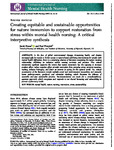Creating equitable and sustainable opportunities for nature immersion to support restoration from stress within mental health nursing: A critical interpretive synthesis
| dc.contributor.author | Howes, Sarah | |
| dc.contributor.author | Warwick, Paul | |
| dc.date.accessioned | 2023-01-04T13:32:54Z | |
| dc.date.issued | 2023-01-03 | |
| dc.identifier.issn | 1445-8330 | |
| dc.identifier.issn | 1447-0349 | |
| dc.identifier.uri | http://hdl.handle.net/10026.1/20136 | |
| dc.description.abstract |
In the face of global environmental changes threatening health, and despite increased calls for nurses to broker access to nature-based well-being interventions for people with mental health difficulties, there is a surprising absence of literature examining the nature–nursing relationship, inhibiting its inclusion within nursing curricula and practice. This critical interpretive synthesis supports the notion that nature immersion has the capacity to increase positive affect, reduce negative affect, provide restoration from everyday stress, promote meaning-making, enhance belonging, and foster an interest in caring for the natural world. Yet, critical examination of the literature reveals multiple social and environmental inequalities and unmasks latent anthropocentric, gendered, and colonialist thinking, which threatens the delivery of equitable and just sustainable practice. Recommendations are made for a transdisciplinary, systemic approach, which recognizes and responds to our shared humanity and vulnerability in pursuit of planetary health. | |
| dc.format.extent | 673-686 | |
| dc.format.medium | Print-Electronic | |
| dc.language | en | |
| dc.language.iso | en | |
| dc.publisher | Wiley | |
| dc.subject | Mental health | |
| dc.subject | Nature | |
| dc.subject | Nursing | |
| dc.subject | Restoration | |
| dc.subject | Stress | |
| dc.subject | Sustainability | |
| dc.title | Creating equitable and sustainable opportunities for nature immersion to support restoration from stress within mental health nursing: A critical interpretive synthesis | |
| dc.type | journal-article | |
| dc.type | Journal Article | |
| dc.type | Review | |
| plymouth.author-url | https://www.webofscience.com/api/gateway?GWVersion=2&SrcApp=PARTNER_APP&SrcAuth=LinksAMR&KeyUT=WOS:000906127900001&DestLinkType=FullRecord&DestApp=ALL_WOS&UsrCustomerID=11bb513d99f797142bcfeffcc58ea008 | |
| plymouth.issue | 3 | |
| plymouth.volume | 32 | |
| plymouth.publication-status | Published | |
| plymouth.journal | International Journal of Mental Health Nursing | |
| dc.identifier.doi | 10.1111/inm.13109 | |
| plymouth.organisational-group | /Plymouth | |
| plymouth.organisational-group | /Plymouth/Faculty of Health | |
| plymouth.organisational-group | /Plymouth/Faculty of Health/School of Nursing and Midwifery | |
| plymouth.organisational-group | /Plymouth/Research Groups | |
| plymouth.organisational-group | /Plymouth/Research Groups/Institute of Health and Community | |
| plymouth.organisational-group | /Plymouth/Users by role | |
| plymouth.organisational-group | /Plymouth/Users by role/Academics | |
| dc.publisher.place | Australia | |
| dcterms.dateAccepted | 2022-12-14 | |
| dc.rights.embargodate | 2023-1-6 | |
| dc.identifier.eissn | 1447-0349 | |
| rioxxterms.versionofrecord | 10.1111/inm.13109 | |
| rioxxterms.licenseref.uri | http://www.rioxx.net/licenses/all-rights-reserved | |
| rioxxterms.type | Journal Article/Review |


